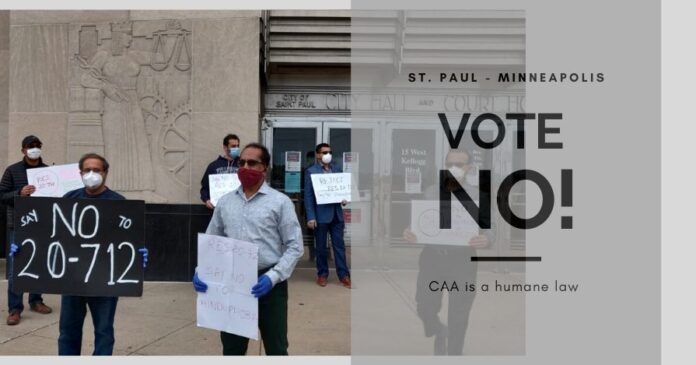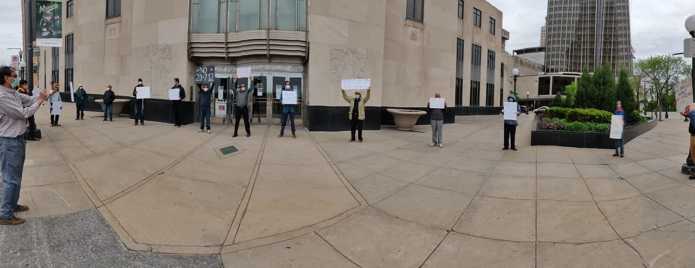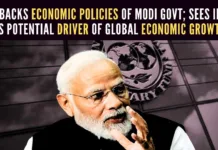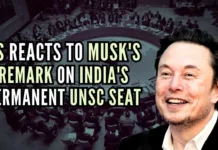
Seattle resolution
First, it was the Seattle City Council. On Feb 3, 2020, by a vote of 5-0 (four members abstained), the Seattle City Council voted to oppose India’s Citizenship Amendment Act (CAA), stating that it was discriminatory towards Muslims and other groups. Kshama Sawant, a Council member sponsored the resolution[1]. They did not stop there. The City Council also passed a resolution to stop the National Register of Citizens (NRC).
It is not clear as to why the City Council passed this. The following questions immediately spring up:
- Why is the Seattle City Council wasting its time and taxpayer money, voting on an internal matter of India?
- How many of the Council members read the CAA[2]? It is three pages long.
- One of the Congresswomen representing Seattle (and the councilwoman Kshama Sawant) is India-born. Surely, they read it? It is in English.
A similar resolution was also attempted in neighboring cities such as Redmond and Mukilteo but it has not succeeded.
Fast forward, to Minnesota
A few weeks later, the twin cities of Minneapolis and St. Paul in the state of Minnesota are trying to pass a similar (almost identically worded to that of Seattle) resolution (RES 20-712 in Saint Paul city council) on May 6th, 2020. During the discussion on 6th May 2020, one member suggested deferring the vote to a later date and it was decided that the resolution will be voted on two weeks later.
Instead of fighting Coronavirus…
One wonders the reason for introducing this symbolic resolution when there are bigger and real challenges facing the twin cities (Coronavirus, a struggling economy, among others). Councilmember Jane Prince mentioned in her May 6th address that she worked with the Council of American Islamic Relations (CAIR) in drafting this resolution. Did she or any other council member seek out opinions from the 50,000 strong community of Indian origin? Locals say they did not get to meet them in person or were brushed aside after a cursory engagement.
Americans4Hindus SuperPAC demands a hearing in person
Dr. Romesh Japra, a co-founder of Americans4Hindus and Dr. Shoba Chokkalingam, a Board member, requested that the City council should hear our side of the story, in person, before voting. Dr. Chokkalingam mentioned that the City Council has resisted meeting the concerned citizens due to the Pandemic. That begs the question as to what the hurry is. What does such a resolution achieve? More importantly, why are the city’s time and taxpayer money being expended on this frivolous Resolution?
APPWW opposed to St. Paul-Minneapolis resolution
The Alliance for Persecuted People Worldwide (APPWW) wrote to the council Members Dai Thao, Rebecca Noeker, Chris Tolbert, Mitra Jalali, Amy Brendmoen, Nelsie Yang and Jane Prince in a formal letter, and expressed its opposition to the Council Resolution 20-712 on India’s CAA and NRC (a bill that is yet to be drafted).
The letter questioned the assertion in the resolution, that the CAA will strip 200 million Indian Citizens who follow the Islamic faith... The complete letter is shown at the end of this article.

Excluding Fellow Americans to Serve Overseas Divisive Agendas
Vishal Agarwal, a long-time resident of Minnesota and Trustee, Executive Council of the Hindu Society of Minnesota shared his thoughts on this with PGurus.
“Instead of focusing their entire energy on keeping the infection curve flat or trend downwards, the city councils of Minneapolis and St. Paul have recently chosen to inject overseas divisive politics into Minnesota and waste our resources by introducing Resolution 20-712, feel many residents of the twin cities.
“The online draft version of this resolution has been edited numerous times but some things stand out. It declares that the current Prime Minister of the largest democracy in the world – India, is Hitler reborn. It alleges that Hindu mobs are wantonly lynching Muslims. That the Indian state is repressing 200 million Muslims by conspiring to strip their citizenship through the Citizenship Amendment Act (CAA), the National Population Register (NPR), and the National Register of Citizens (NRC). Calling Prime Minister Modi a Hitler is not just an insult to the Jewish community, but also to the intelligence of the hundreds of millions of Indians who elected him to power. It also overlooks the fact that Narendra Modi, as well as the current Indian President, belong to historically marginalized communities in India and yet they triumphed against all odds. The CAA expedites the path of citizenship for six religious communities escaping persecution in the theocratic Islamic states – Pakistan, Afghanistan, and Bangladesh. In the first two, Hindu-Sikh minorities have declined by more than 90% in the last 80 years. In Bangladesh, they have reduced from 28% to 10.5% of the country’s population since 1941. In India on the other hand, it is the proportion of the majority Hindu community that has declined from 85% to 80% from 1951 to 2011. The Tribal population, largely Hindu, too has increased its proportion. The numbers speak for themselves. The NPR is simply a decadal census exercise that has been carried out in India for almost 150 years now. The NPR has nothing to do with who is a citizen and who is not. The NRC is still not defined and was implemented reluctantly by the Indian government in a single state due to a directive by the Supreme Court of India after a petition was filed when the present opposition party was in power.
“The CAA does not impact current Indian citizens and parallels the Lautenberg Amendment that selectively allows the United States to grant refuge to specific oppressed religious minorities in certain nations like Iran. The CAA was approved by 79% members of the Lok Sabha (Indian version of the House of Representatives) and 54% members of the Rajya Sabha (India’s Senate) even though Modi’s political party, the Bharatiya Janata Party (BJP) holds a mere 54% and 35% of the seats in them respectively. This indicates broad-based democratic support for the Act. The President of India granted assent to the Bill. Activists, largely Indian Leftists and Islamic groups, filed 59 lawsuits in the Supreme Court of India, which has twice refused to strike down the law. The matter is still sub-judice. Nevertheless, the passage of the law immediately saw violent protests at two Muslim universities, two Left citadels, and in a few other areas dominated largely by the same groups. Trains and buses were burnt, private vehicles were torched, public property was destroyed and cops were lynched. In Northeastern India which would potentially take the brunt of refugees, the protests were more large-scale, peaceful but short-lived. In some states hit by violence, the government reacted with arrests and punitive fines to douse the fires. Repelled by the violence, the support from a section of Hindus that initially opposed CAA soon petered away giving the movement a de facto Muslim character. In February 2020 while President Donald Trump visited India, the situation spiraled out of control in New Delhi. A day and night of orgy in which mainly Hindus and Sikhs were killed were then followed by two days of retaliation leading to largely Muslim deaths. Western media amplified the one-sided stories in Leftist Indian English media, ignoring the more broad-based and nuanced news reports in Indian vernacular press that had more feet on the ground. The former reported only Muslim deaths, ignoring that 20 Hindus and Sikhs were also killed. It was the Pandemic that finally killed the already dying protests by Left-Islamic groups.
“The secretive way in which the divisive anti-CAA resolution was introduced in the Twin Cities councils is eloquent. The city councils claim that they speak for South Asian communities. I actively volunteer for several broad-based community organizations – Indian and Hindu. None of my contacts were aware of the resolution. Their organizations were either never contacted, or their concerns were hurriedly brushed aside. The only two sources the councils relied on were two activist Islamic organizations, and perhaps isolated individuals from other faith communities. Therefore, we can safely reject their claim of speaking for South Asians and conclude that they have really excluded South Asian Hindus, Sikhs, Jains, Christians, Jews, Buddhists, and Bahais. Ironically, over 75% of the beneficiaries of the amnesty offered by CAA are Pakistani Hindu Dalits, precisely the group this anti CAA/ NRC resolution claims to support.
“The NRC simply does not exist. To imagine a doomsday scenario in which Indian citizens will be asked to prove their citizenship by producing non-existent papers resulting in the disenfranchisement of 200 million of Muslims is too ridiculous to accept. Which country can build detention centers for 200 million humans and feed them indefinitely? The spurious lists of documents presumably needed for NRC do not exist even for my own siblings and parents in India. Do you think a Hindu like me would ever accept these requirements that are imagined by fear-mongering ideologues? It is therefore unacceptable that the city councils should condemn a non-existent NRC in their resolution. Instead of antagonizing the largest secular democracy in the world, did the city councils and their instigators ever ask why non-Muslims and minority Muslim sects are being progressively cleansed out from the three Islamic nations surrounding India? Surely that would a more pertinent question to ask. The Indian Association of Minnesota has already issued a note of dissent. In an unprecedented step, the Hindu Society of Minnesota sent an informative, neutral, and apolitical email to its supporters to apprise them of the situation.
“I see the CAA as an act of great compassion towards those minorities who were trapped in these three theocratic nations and who need a refuge that they can truly call their home. My own maternal forefathers fled Pakistan in 1947 to escape forcible conversion to Islam. So did my in-laws. My grandparents had a choice and they fled. But many did not, till the CAA came to rescue them. As a child, I grew up in an apartment owned by erstwhile Hindu refugees from Bangladesh. The Landlady told me how her grandfather was sliced into two at his waist in Dhaka (Bangladesh) in 1947. Yet, the narratives of victimhood, grievances, and revenge were never our defining worldviews. We were asked to look into the future and focus on being inclusive, productive, and educated citizens. My paternal grandfather was orphaned during the Spanish Flu Pandemic. Yet, he rose to become the first Mayor of New Delhi in independent India as a Congress party politician when the New Delhi city council was elevated to the status of a Municipal Corporation. My grandfather would have never supported a divisive resolution in this time of Covid-19 Pandemic even if it were directed against his political opponents, especially one that indicts an entire nation and by implication, its immigrants within Minnesota.
“Let us fast forward from 1947 to 2009 when I was administered my oath to American citizenship. The judge exhorted the cohort of new citizens to leave behind their baggage of past prejudices and enmities and embrace a status and dreams that were common with other US Citizens. I took that to heart. I did not disown my heritage or my trans-generational trauma of being a descendent of ethnically cleansed maternal grandparents at whose residence I spent half of my childhood. But I vowed not to misuse my new nation or her institutions to serve overseas divisive political agendas. I chose the United States to be my home and American priorities are now my priorities. Our country is one of the most inclusive and diverse in the entire world and Minnesota is a welcoming state. If the council members were astute and inclusive, they would have consulted the stakeholders. Their exclusion of Indian Americans and non-Muslims in a meaningful manner has created a rift in our community that did not exist earlier. Overseas events, unfortunately, tend to impact perceptions about some ethnic groups in our nation. Islamophobia is an example of how foreign events can feed prejudice against American Muslims. Did the council members reflect upon how their resolution will harm Indian Americans given that there have been reported a couple of attacks already on the West Coast after Seattle city council passed a similar resolution? Is Saint Paul trying to fight Islamophobia by promoting Hinduphobia? Are the council members using Indian Americans as political pawns to get the support of Muslim Americans for the Democrats by introducing these inflammatory Resolutions that are full of blatant lies?
“Today, the world needs to fight the Pandemic unitedly instead of dissipating our energies over divisive resolutions. Prime Minister Modi has hosted the American Presidents thrice since 2014 and has himself been welcomed by the US Congress with great honor. The two countries are pooling resources to find a medical solution to Covid-19. Indian American physicians are at the forefront in this new war against the pathogen. Numerous Indian, Hindu, and Sikh community organizations in Minnesota are volunteering hard to serve other Minnesotans. How does this Resolution aid healing? How does it benefit anyone other than embolden partisans?
“There are 50,000 people of Indian origin in the Twin Cities. They are outstanding members of the community, contributing to a variety of notable sectors, including but not limited to healthcare, bio-tech, and tech, entrepreneurship, education, tourism and food service, retail. When a city council paints an entire country in broad and factually dubious strokes, it reflects on all people of Indian origin, and especially on Hindus Americans.
“Indian businesses have made a significant investment in the Twin Cities and are creating jobs for Minnesotans. According to a study by the Confederation of Indian Industry, Minnesota has attracted more than $1.8 billion and created 2,500 jobs as a direct result of investment from India-based companies, ranking Minnesota third among American states in Indian investment dollars. Several Indian companies are doing business in Minnesota: TATA Consultancy Services, Infosys, Wipro, and ITC Infotech are in the IT and telecom industry; Essar in the materials and manufacturing sector. Twin Cities-based businesses also have significant, mutually beneficial investments in India. For example, Cargill began a five-year investment plan of $240M in 2017 intended to food safety and economic development and benefit the food processing and agriculture industries. 3M is heavily invested in India for over 30 years now.
The city council is using its position of power and influence to wade into an arena of foreign policy that it does not have the requisite expertise or context for and perpetuating unverified information that stereotypes Hindus and supporters of the BJP. This will create an unnecessarily hostile environment for Hindus of Indian origin in the Twin Cities because of associations and assumptions that will now be made about them, especially by those unfamiliar with the complexity of ground realities in India. I hope that they focus on tasks and policies that ensure a brighter future for Minnesotans including my own children who were born and raised here. As we unite to fight a Pandemic, this is not the time to squander our resources to promote divisive and irrelevant agendas while excluding the legitimate stakeholders.”
St. Paul-Minnesota should vote no
The twin cities council should decisively vote against Resolution 20-712. India’s CAA is a humane act, intended to regularize the applications of persecuted minorities in three countries, all of whom were part of one political entity before 1947. As mentioned by Vishal Agarwal, instead of antagonizing the largest secular democracy in the world, did the city council and their instigators ever ask why non-Muslims and minority Muslim sects are being progressively cleansed out from the three Islamic nations surrounding India? Surely that would a more pertinent question to ask.
References:
[1] Seattle City Council votes to oppose India’s National Register or Citizens, Citizenship Amendment Act – Feb 4, 2020, SeattleTimes.com
[2] The Citizen Amendment Act (CAA) – The facts – Dec 19, 2019, PGurus.com
APPWW Opposition to St. Pau… by PGurus on Scribd
- Prime Minister Narendra Modi: A Gujju businessman who does not invest his precious time for a losing battle - April 13, 2024
- NIA arrests two accused Shazib and Taahaa in Bengaluru’s Rameshwaram Cafe blast case from Kolkata - April 12, 2024
- National Herald scam: Adjudicating Authority upholds Rs.752 crore assets attached by ED - April 11, 2024











“It is not clear as to why the City Council passed this…..”
This is very sloppy writing. Please read the resolutions, watch the FULL hearing on YouTube then write about it. The council members clearly and explicitly explain their positions.
Albany NY and Cambridge, MA also
@ Dr Gopalakrishnan, you are mistaken. Read the Seattle resolution and amendment. The goal is to create a movement in several cities then congress will be forced to take up the issue. If a democratic president gets elected, we can see sanctions on India.
This sounds like a couple of Municipal bodies in Gwalior and Patna passing resolutions to condemn Trump for building a wall at the USA-Mexico border. Americans would scoff and laugh at these Indian buffoons meddling. Pakis and Indies who migrated to USA follow and adhere to the rules of the land where they decide to live and not meddle in internal security decisions of India.
What right or compulsion do they have to involve in the internal affairs of democracy..?
The objective is to bleed by a thousand cuts. Look at the current effort to get Indian media blocked in UAE according to some news sources. Also look at how Alexander Pilot videos portray india vs other countries on YouTube. Some most Indians don’t search in Russian, the latter isn’t on their radar.